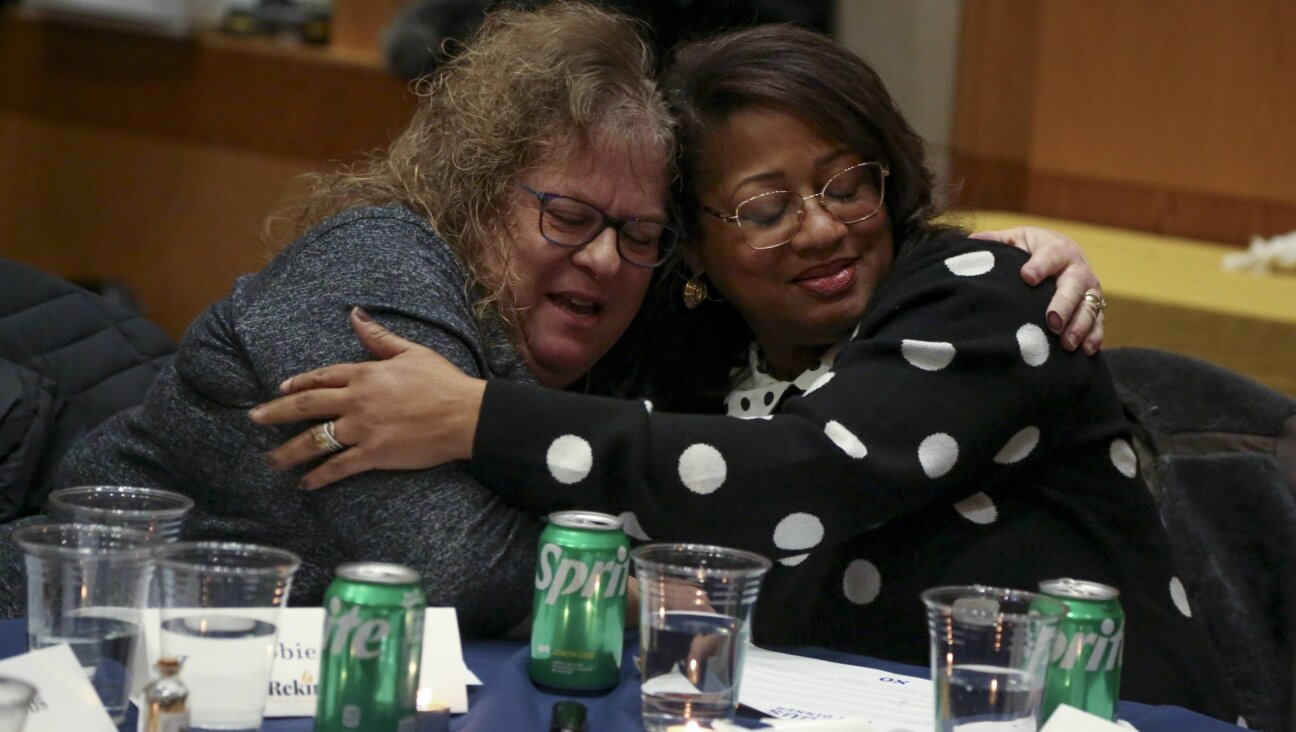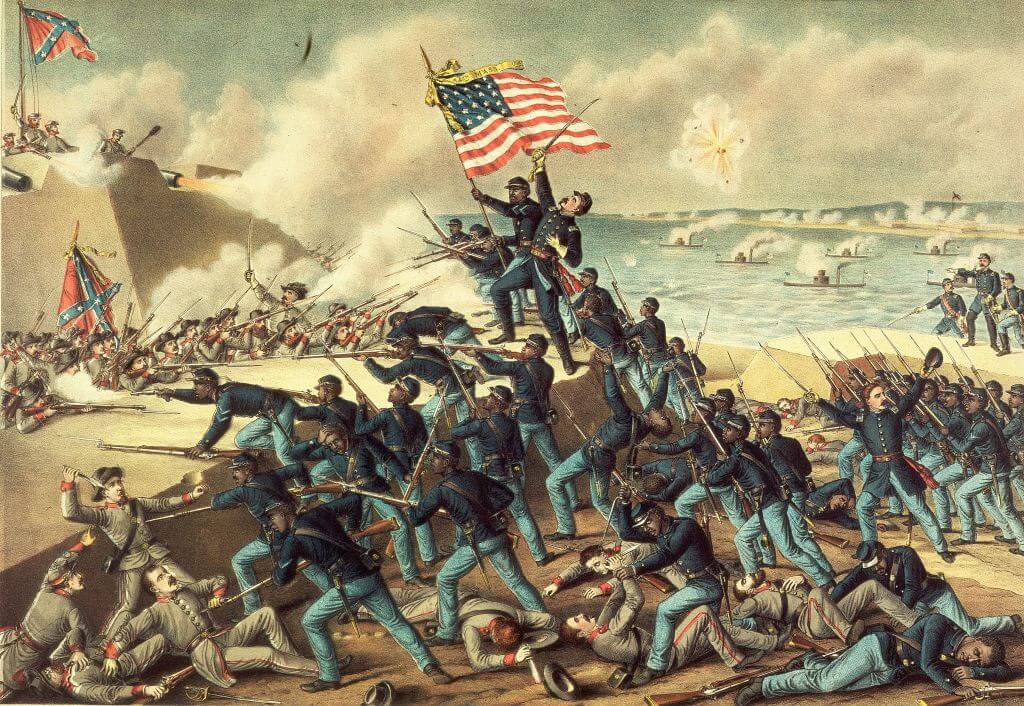J Street’s Gaza War Support Wins ‘Moderate’ Praise — But Alienates Some Backers

We Don’t Agree: Jewish pro-peace protesters prepare to be arrested during civil disobedience action at the Conference of Presidents meeting. Image by martyna starosta
The last time Israel invaded Gaza, in 2008, the activist group J Street took a hard line against Operation Cast Lead. J Street framed Israel’s attack as collective punishment and demanded an immediate end to the conflict.
The organization was pilloried by American Jewish leaders.
This time around, J Street has taken a radically different position, sticking close to other mainstream Jewish groups. J Street has asserted Israel’s right to defend itself, and has condemned Hamas while expressing concern for Palestinian and Israeli civilians.
The more moderate approach has won the group praise from some former critics, while threatening to alienate core activists. It has left American Zionists critical of the war without any established Jewish organizations on their side, as both Americans for Peace Now and Ameinu have also chosen not to criticize the invasion.
Former high-ranking J Street staff members were among the organizers of a July 28 protest in New York City against Israel’s invasion of Gaza. They acted under the name #ifnotnow and made no mention of their former J Street affiliations.
“J Street got really criticized for the way it handled it in Cast Lead,” said Kathleen Peratis, a former J Street board member who split with the group in 2011 after visiting Gaza and meeting with Hamas officials. “It has made a very strong effort to modify its language… so that it can be a credible player and a credible applicant to the [Conference of Presidents of Major American Jewish Organizations].”
J Street tried to join the Presidents Conference, a round table of national Jewish organizations, in a lengthy process that culminated in April with a vote that rejected J Street. But the application to the Presidents Conference came at the tail end of a multiyear process of moderation that is on display in J Street’s response to the ongoing Operation Protective Edge.
“We are much larger, much bigger, have a more diverse and varied constituency,” said Jessica Rosenblum, J Street’s director of media and communications, of the difference between her organization’s response to the Gaza conflicts in 2008 and 2014. She also said that the crisis itself is different, citing the increased range of Hamas’s rockets and the ratcheting escalation. “I think it stands to reason now that our position would be different than it was in 2008,” she said.
On December 28, 2008, a day into Operation Cast Lead, J Street [wrote a letter to supporters][1] asserting that “neither Israelis nor Palestinians have a monopoly on right or wrong.”
“While there is nothing ‘right’ in raining rockets on Israeli families or dispatching suicide bombers, there is nothing ‘right’ in punishing a million and a half already-suffering Gazans for the actions of the extremists among them,” the group wrote.
Blowback came fast. Responding in a column in the Forward, Rabbi Eric Yoffie, then president of the Union for Reform Judaism, slammed the letter, calling it “morally deficient, profoundly out of touch with Jewish sentiment and also appallingly naive.”
The response shook the fledgling lobby. J Street invited Yoffie to its convention in 2009, and the group began to make efforts to shift its rhetoric and message. “They were a young organization,” said one activist who is part of a progressive Jewish organization and not authorized to speak on the matter. “Since then, J Street has tried to appeal more to the center.”
That shift was apparent in 2012, at the start of Operation Pillar of Defense, a brief aerial bombardment of Gaza. J Street’s statement on the operation said that it “stands with Israel” and that the group affirmed Israel’s right to defend itself.
Since the beginning of the current Gaza conflict, J Street’s differentiation from the rest of the Jewish community has been largely limited to the tone of its statements.
Yoffie, in a July 29 interview, praised the group’s response to Protective Edge. “I think they’re more sensitive to the feelings of the broad community at moments of crisis such as this,” he said. “I see a major change since 2008, and I think it’s a welcome change.”
J Street condemned Hamas for rejecting a proposed cease-fire July 15. (Hamas leaders said they had not been consulted on the agreement; it had been proposed by Egypt, whose leaders bitterly oppose Hamas.)
In an earlier statement on Protective Edge, J Street said that it “recognize[s] Israel’s right to respond to the rocket fire and to defend its soil and its citizens proportionately while making every effort to minimize civilian casualties.”
In that same statement, J Street included a lengthy list of addenda, saying that it “grieve[d]” for families in Gaza, for the families of the three Israeli teens murdered in the West Bank and for the Palestinian teen murdered in Jerusalem. The group also stated that it saw no military solution to the conflict.
That tonal difference continues to set J Street apart from some mainstream Jewish groups. In Boston, a local J Street chapter pulled out of a communal pro-Israel rally after deciding that the tone of the proposed event didn’t fit its message. J Street was initially a co-sponsor of the July 17 rally organized by the Jewish Community Relations Council of Greater Boston. The group dropped out after learning more about the rally’s program.
“As we got more information about the rally’s messaging points, I felt like there was no talking about the loss of human life on both sides, or talking about what it would take to get a two-state solution,” said Rabbi Margie Klein, advocacy co-chair of J Street’s local executive committee in Boston and spiritual leader of Sha’arei Shalom, a synagogue in Ashland, Massachusetts.
In New York, J Street did not co-sponsor a large pro-Israel rally organized by the Jewish Community Relations Council of New York, held near the United Nations on July 29.
Two hours before the JCRC rally, dozens of activists gathered outside the building where the Presidents Conference has offices to say Kaddish, the mourner’s prayer, in protest of Gaza deaths. The same group, #ifnotnow, had organized a similar action in the same space days earlier.
The effort was launched by four activists, two of them former high-ranking J Street staff members: Carinne Luck, who joined J Street before its launch in 2007 and left in 2012, when she was the group’s vice president of field and campaigns, and Daniel May, director of J Street U, the group’s university arm, from 2010 through 2013. A third, Max Berger, worked as a new media assistant at J Street. He was arrested with eight other protestors during the July 29 action after entering the lobby of the Presidents Conference building and refusing to leave.
Some of the arrested activists were held until midday the following day.
Other former high-ranking J Street staffers attended one or both of the #ifnotnow protests, including J Street’s vice president of communications and new media from 2008 until 2011, Isaac Luria, who wrote the 2008 Gaza letter that Yoffie condemned, and Tamara Shapiro, director of J Street U from 2009 to 2010. Simone Zimmerman, the national president of J Street U’s student board in the 2012-2013 school year, is #ifnotnow’s media liaison.
Some of the former staffers said that they didn’t oppose J Street’s long-term strategy but felt hemmed in by its tactics.
“I understand the strategy that J Street has adopted, and I think it’s fine to have an organization like J Street moving that strategy,” May said. “I also think that there’s a need for an approach that fits this moment.”
Others described a sharper split between J Street and their new group. “This group has come together because we don’t share J Street’s patience with the Jewish institutional community,” Luck said.
Rosenblum declined to comment on the actions of the former staff members. “There’s a unique challenge to trying to move a movement forward that isn’t the same… [as] taking a personal stance on an issue,” she said. “At moments like these, when Israel’s not only security but its prospects for peace are threatened, that raises a lot of very strong emotion.”
Contact Josh Nathan-Kazis at [email protected] or on Twitter, @joshnathankazis.

















